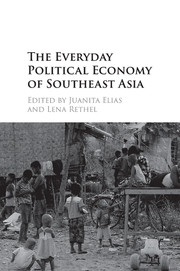Book contents
- Frontmatter
- Epigraph
- Contents
- List of Figures and Map
- List of Tables
- Notes on Contributors
- Acknowledgements
- Part I Introduction
- Part II From Development to Multiple Modernities
- Part III Widening and Deepening Markets
- 5 The Political Economy of Muslim Markets in Singapore
- 6 Islamic Finance in Malaysia: Global Ambitions, Local Realities
- 7 Resisting Marketization: Everyday Actors, Courts and Education Reform in Post–New Order Indonesia
- Part IV People, Mobilities and Work
- Part V Conclusion
- Index
- References
5 - The Political Economy of Muslim Markets in Singapore
from Part III - Widening and Deepening Markets
Published online by Cambridge University Press: 05 August 2016
- Frontmatter
- Epigraph
- Contents
- List of Figures and Map
- List of Tables
- Notes on Contributors
- Acknowledgements
- Part I Introduction
- Part II From Development to Multiple Modernities
- Part III Widening and Deepening Markets
- 5 The Political Economy of Muslim Markets in Singapore
- 6 Islamic Finance in Malaysia: Global Ambitions, Local Realities
- 7 Resisting Marketization: Everyday Actors, Courts and Education Reform in Post–New Order Indonesia
- Part IV People, Mobilities and Work
- Part V Conclusion
- Index
- References
Summary
Introduction
On 26 March 2010, I was in the audience for the Fourth International Halal Food Conference held at the Sheraton Hotel in Brussels, Belgium. From around the world, Islamic organizations, halal certifiers and companies had come to attend this conference held by the Islamic Food Council of Europe, one of the world's major halal certification bodies. A Malaysian woman in the Q&A session wants to know why and how it could happen that halal pork turned up in the Supermarket NTUC FairPrice Co-operative in Singapore when everybody knows that pork cannot possibly be halal. Fierce competition exists between Malaysia and Singapore, not least in the struggle for world leadership in global halal production, trade and regulation. The representative from the Majlis Ugama Islam Singapura (MUIS) – the Islamic Religious Council of Singapore – that acts as Singapore's state halal certification body agrees that pork can never be halal and that it would compromise Shariah principles (Islamic law) if it were labelled as such. She explains that the incident arose because of a rumour in an email that halal pork was on sale in Singapore.
MUIS inspectors did not find any halal pork when investigating, and the MUIS representative calls this a ‘sabotage’ incident. The subsequent police investigation could not place the responsibility. This incident was big in the media, and the picture of ‘halal pork’ allegedly sold by the supermarket showed a packet of FairPrice's Pasar brand pork bearing a green ‘halal’ sticker. A FairPrice spokesman said that the incident was regarded as ‘a deliberate and wilful act of mischief’ (Straits Times, 25 November 2007). MUIS carried out its own checks at eight FairPrice outlets and found that none of the specified items bore the MUIS logo. A MUIS spokesman said, ‘We treat the case of the MUIS halal certification mark on the packaging containing pork very seriously as the halal mark has been abused.’ He added that under the Administration of Muslim Law Act (AMLA) that governs Islam and halal in Singapore, an abuser of the MUIS halal certification mark is liable to a fine not exceeding S$ 10,000 or to a jail term not exceeding twelve months, or both. This means the perpetrator is culpable even if the mark is a sticker, a fake or was digitally added (Straits Times, 25 November 2007).
- Type
- Chapter
- Information
- The Everyday Political Economy of Southeast Asia , pp. 95 - 115Publisher: Cambridge University PressPrint publication year: 2016

